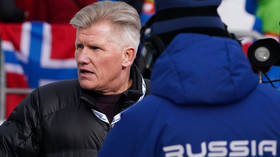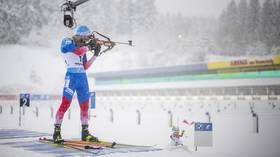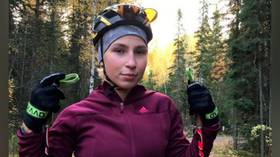‘Russians will be blamed when it rains,’ says Olympic hero

Dmitry Vasilyev, the Russian biathlon legend who won gold at the 1984 and 1988 Olympic Games, has bemoaned the political landscape currently facing Russian athletes, and says that he wouldn't be surprised if they were soon blamed for poor weather.
Russian athletes have been hit with a wave of sanctions and suspensions in the wake of the onset of the country's military operation in Ukraine in late February, as various sporting federation across the globe seek to restrict the country's sporting ambitions amid a swirl of pressure from the West.
Some of those measures were doubled-down upon this week. The IBU, the international body which governs biathlon events, has sought to extend the ban on Russian athletes from global competition – something which Russian biathlon figures described as “hypocrisy” and a continued “politicization” of sport.
The IBU Executive Board has also suggested that if the Russian and Belarusian biathlon federations want their membership suspensions lifted, they should formally distance themselves from Russia's military campaign in Ukraine and “ensure that none of their officials or athletes are actively involved in the Russian military and/or take any part in the war effort.”
However, critics of the moves made by the international sporting community have stated that punishing athletes for actions made by their government only serves to undermine the unifying nature of sport – adding that various other countries involved in international disputes have been permitted to continue competing in international sport.
Meanwhile, debate has also swirled in Russia about athletes potentially seeking to change nationality to circumvent the bans.
Olympic icon Vasilyev, 59, commented on that prospect as he condemned the sporting sanctions against Russia.
“I don’t think that everyone is now ready to change sports citizenship,” Vasilyev said in comments to Match TV.
“They will be reminded that they are Russians and that they are to blame for everything, that the sun is shining or it is raining,” he added wryly.
The IBU is set to discuss the recommendations from its Executive Board on extending the ban on Russian athletes at its Congress in Austria next month.
However, Vasilyev said in separate comments to RT that members of the organization would be afraid to speak out against the IBU leadership’s anti-Russian recommendations.
“In principle, they cannot have their own point of view, let alone express it. This is fraught with repercussions for them, in the spirit of the most difficult times of the Soviet Union, when dissent was punished very harshly,” he said of IBU members.
“Unfortunately, do not know how to learn from history… even though they position themselves as a democratic society.
“There is no freedom of speech. Even those people in the international federation who really think differently – and there are many of them – cannot speak out openly and at best they are silent, and at worst they are obliged to speak out against Russia.
“Therefore, it is not necessary to count on something positive, such is the current situation. But all this froth will come off after a while.
“It will end with the inhabitants of Western states taking to the streets and saying: ‘Enough! We need to negotiate with Russia!’ Only at this moment will the whole saga with sports end,” added Vasilyev.
The IBU initially imposed a blanket ban on Russian and Belarusian athletes in early March, following a recommendation from the International Olympic Committee (IOC).
However, in suspending the membership of the Russian and Belarusian biathlon unions, it has gone a step further than many other federations across various sports.
The issue of the Russian and Belarusian bans is set to be discussed at the IBU Congress in Salzburg on September 15-18.
Russian biathlon officials have noted that they are still appealing the initial IBU ban at the Court of Arbitration for Sport (CAS) in Switzerland, and have vowed to “prepare a legally justified appeal to all Congress participants and IBU members, in which our position will be detailed.”














